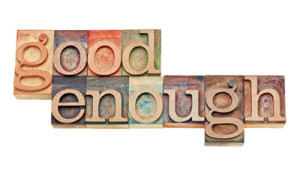I cannot begin to estimate how many times the word ‘mediocre’ or some variant comes up in conversation.
 Let’s just say – often. Too often. Certainly far more frequently than five years ago or even three.
Let’s just say – often. Too often. Certainly far more frequently than five years ago or even three.
Why? Because ‘good enough’ has been absorbed into our cultural value systems. In fact, it seems to have replaced striving for distinction as our desired norm.
Sometimes, ‘good enough’ is exactly the right answer – in business and relationships – especially when we’re overwhelmed with commitments and under-armed with resources like time, money and necessary skill sets.
But when ‘good enough’ supplants innovation, excellence, or the pride that comes with either – shouldn’t we worry? When it feels as if mediocrity is being rebranded and touted as a good life, I feel the hairs on the back of my neck come to attention; I no longer recognize my touch points and I don’t care much for my surroundings.
A short column in The New York Times examines this phenomenon of “same-old-safe-old” in the context of the global economy and the fashion industry, but I recognize the prevalence of its applicability everywhere I turn. Don’t you?
Customer service comes to mind first and foremost. Generally speaking, it’s dreadful: Anything “off script” leaves a gaping hole; knowledge is minimal; efficient systems are anything but; follow-through is spotty. Fortunately, there are exceptions. But those exceptions were once the norm.
What Functions Well in Your World?
I suppose we could ask ourselves what works, what works well, or what seems not to work… My answer to that last might be – too many services on which we increasingly rely.
And we know the reason: money, which is not to ignore the foundational issues to do with values.
I suppose, like the author of The Times article, we could consider creative industries and the extent to which their luminaries are willing to take design risks. But we could also look at our schools, our health care systems, our government (of course) and conclude: Good enough appears to be the target; too often, or so some of us believe, we fail to meet even that.
Other examples of mediocrity?
Job performance. Crumbs for relationships. Our students who (of necessity) trade acquiring critical thinking skills for building resumes. Again, we understand many of the reasons underlying each of these, but we seem incapable of achieving significant progress toward solutions.
How about our political candidates? How about their ads with a target-the-ignorant-masses approach? When is the last time you voted for someone with an in-depth understanding of what they believe? When is the last time we felt our candidates were actually expressing what they believe?
The issue of political leadership and trust is deeply saddening. What happened to our best and brightest throwing their hats into the ring? Instead, it seems to be our wealthiest in the governmental game, seeking the relative status quo.
Cynical vs. Realistic
Cynicism?
Yes, cynicism is one by-product of a culture that perceives ‘good enough’ as a rational if tepid goal. But I believe one of the root causes of that cynicism – and our settling for mediocrity – is a prevailing sense of futility.
Isn’t that part of our weary willingness to accept “average” and continue lowering the bar? Don’t we then position ‘good enough’ as a win?
Naturally, comparisons are the bread and butter of mediocrity: If we’re doing better than “the other guy,” we call it a victory. However, the overall downward drag of less emotional (as well as financial) investment chips away at the desire to do better.
And the role of fatigue in this equation? Economy fatigue? War fatigue? Income gap fatigue? Debt fatigue?
No wonder we take to our smartphones with their dopamine spike delivery – for distraction – and possibly to convince ourselves that things aren’t as bad as they seem, ever poised to find a positive spin.
Economies of (Stagnant) Scale
Perhaps The Times columnist nails it as she ties her perception of flat fashion risk to macroeconomic malaise.
Certainly, as described in this Spiegel article on Zombie Capitalism, we would be hard-pressed to discount the sluggish, slowed, concerning global economy as we sense that hybrid systems are required, although moving in their direction is anything but a given:
The American economy isn’t growing even half as quickly as did in the 1990s. Japan has become the sick man of Asia. And Europe is sinking into a recession… Capitalism in the 21st century is a capitalism of uncertainty…
Exhausting, isn’t it? And demotivating. No wonder we live by ‘good enough.’
But adequacy doesn’t breed brilliance; it assigns inertia to the head of the lethargic charge – if you can call trudging through the mire a charge at all.
And I suffer from it as much as the next guy. Except… I get angry. I know I can do better. I see examples, typically by individuals or small teams, of adherence to standards that remain high. This is no doubt why I continue to believe many of us can do better, motivated by the possibility of something more than mediocrity, which doesn’t suit who we are. And frankly, creating or sustaining mediocrity feels lousy.
Almost as lousy as the powerlessness that feeds it.
Monday Mood Killers… and Tuesday, Wednesday, Thursday…
I note the way my own little world is fragmented, and the extraordinary amount of time and energy expended dealing with poor processes, insufficient training and general mediocrity everywhere I turn. What was once straightforward – dealing with service providers, for example – is an increasingly burdensome time suck, destroying hours and outlook.
We find our standards changing: The personal accountability of a live representative on the phone resolving an issue becomes a shining moment; exemplary even. We know that trained staff are more capable of managing problems (and shoring up customer loyalty), and yes, we all understand cost drivers. But for the recipient of personalized service, the relief is palpable.
As already noted, this is too often the exception, as ‘good enough’ which is not good enough looms as depressing and persistent.
And then there is the economy, as the effects of “Zombie Capitalism” are elaborated in the Spiegel article:
Be it in Japan, Europe or the United States, companies are hardly investing in new machinery or factories anymore. Instead, prices are exploding on the global stock, real estate and bond markets, a dangerous boom driven by cheap money, not by sustainable growth… While workers’ wages are stagnating and traditional savings accounts are yielding almost nothing, the wealthier classes — those that derive most of their income by allowing their money to work for them — are profiting handsomely.
We Interrupt Your Regular Programming for a Reality Check
Right. The rich grow richer sitting on their money; CEOs rake in millions in annual compensation; politicians fight raising the minimum wage.
Try $7.25/hour (federal) with the highest state minimums at $9.50 (D. C.), $9.10 (Oregon) and $9.00 (California).
Here’s a quick calculation: Working full-time (2080 hours/year) at $7.25/hour yields an annual gross of $15,080. Can you support a family on that? Can you support yourself?
At the $9/hour rate – not the federal minimum wage – we’re talking about earning $18,720/year. Can you manage on that?
According to the US Department of Health and Human Services, the poverty line is $11,670 for one person (in the contiguous 48 states). At the current minimum wage, the annual income we just calculated ($15,080) is a whopping $3,410 over the poverty line.
For a family of four, the poverty line sits at $23,850/year. Think you could feed, house and clothe four people on that? Curious to know the poverty line for a two-person household? $15,730 – barely over the current minimum wage.
Some 46 million Americans live in poverty, with the US Census Bureau reporting a slight decrease in 2013. An interesting (contrasting) note: Roll Call published the increase in net worth of our Congress – $150 million – minimum.
I quote:
The combined minimum net worth of Congress jumped — up more than $150 million to $2.1 billion — according to a CQ Roll Call analysis of the financial disclosure forms for every member of Congress and delegate who filed one for 2013… That’s an increase of about $300,000 to $3.9 million per lawmaker…
I leave you to ponder the numerous implications of that little example of the income gap.
Metaphor, How I Love Thee
Speaking of which, the Spiegel article cites Harvard economist Larry Katz with an apt albeit merciless metaphor:
US society has come to resemble a deformed and unstable apartment building: The penthouse at the top is getting bigger and bigger, the lower levels are overcrowded, the middle levels are full of empty apartments and the elevator has stopped working.
In this sense, the crisis of capitalism has turned into a crisis of democracy. Many feel that their countries are no longer being governed by parliaments and legislatures, but by bank lobbyists…
A crisis of democracy, indeed. Revisit that Roll Call data on our members of Congress. (Are you sure you don’t want to get out and vote — not just every four years, but each and every time you have the opportunity?
Economic reality (or posturing) aside, there are circumstances in which good enough really is good enough. But this cannot be sufficient for everything and we know that; we know it in our bones and even more so in our very American bright idealism that wishes to live in the light.
This is my fear: ‘Good enough’ is becoming our mantra for making peace with mediocrity, for exhausted excuses masquerading as reasons, and is a de facto admission of our pessimism, however un-chic to proclaim it as such.
Worse?
This realization: ‘Good enough’ does not breed vision. And whether we’re talking about our own lives or the future of education and healthcare, business and the arts, communities, and governments – isn’t vision precisely what we need? Isn’t it what inspires us to reach for meaningful lives and tangible achievements?
For those interested in high quality long journalism with an international perspective, I strongly recommend Spiegel Online International.
You May Also Enjoy


Thank you, DPoC, for saying these things in a forum that desperately needs to hear them. Our politics and our economy have been hijacked, and what the “powers” deliver in return for our support is not something we should settle for. When will the anger of the center well up as we have seen it well up on the right? The tea party concept was quickly bought out by those same powers the Republican tea party seemed set to oppose. Now it functions to augment the power of the financial king-makers.
Resistance must be grounded in ideas and the communications of reasonable people demanding something more of their governing power than simply “good enough.” Keep punching away, DPoC. You are onto something that your readers need to hear more about, and ponder for this election, future elections, and their communication with their representatives every day of the year. As a voter you should never allow your representatives to forget that you watch them, vote, and will — if necessary — run against them.
Scare the absolute bejabbers out of them. It’s the only thing that will ever make them honest.
Thank you, Mr. F – for your thoughtful reading and commenting. If only more of us would take the time to move beyond the labels and sound bites, and to consider disparate opinions that are informed for the most productive discussions. But you note how few join in this type of conversation, which I thoroughly understand. People are tired, so tired. They seek distraction and yes, information, but not if they have to think too hard. We seem to be losing that habit. But if we don’t pay attention and demand something better, it will only grow worse.
First off, just let me say how really happy I was to get an email notification for DPOC. And definitely, bravo for this excellent piece. You know that I suffer at times from being pulled between two cultures – France and the US – but it certainly gives me perspective on both. I was both shocked and scared during my recent extended visits to the US that the machine is entirely running the show and in large part, folks are, as you say, too tired to resist the schlock that they are fed. The fear mongerers are getting mighty rich off it all and soon, we won’t even remember what the other options are…